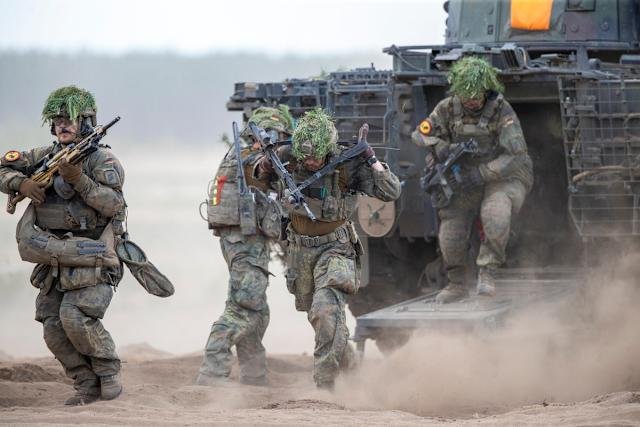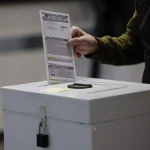
The Missing Soldiers: A Presidential Response Under Fire
Posted in :
Missing U.S. Soldiers in Lithuania: A Crisis of Leadership and National Trust
This blog post delves into President Trump’s recent comments regarding the four missing US soldiers in Lithuania, examining the public reaction, implications for national security, and what this incident reveals about military transparency.
When I first heard about the four US soldiers missing in Lithuania, my heart sank. As a citizen, it’s unnerving to think of our brave personnel vanishing in foreign lands. But what caught my attention even more was President Trump’s response—claiming ignorance on the situation. This triggered waves of outrage and left me questioning how leaders handle accountability in times of crisis. Let’s explore this chaotic mix of military urgency, presidential communication, and public reaction.
The Context of the Incident
Four US soldiers have gone missing in Lithuania. This alarming situation has raised many questions. Who are these soldiers? What happened to them? And why is this incident significant?
Overview of the Missing Soldiers
The missing soldiers are part of a larger military presence that the United States maintains in Lithuania. They were reportedly involved in routine operations when they disappeared. The details surrounding their disappearance remain unclear. However, the urgency of the situation has prompted immediate action.
As we dig deeper, we find that these soldiers represent more than just individuals; they symbolize the commitment of the US to its allies. Their absence is not just a personal tragedy; it’s a matter of national concern.
Details About the Search Operations
In response to the disappearance, search operations have been initiated across Lithuania. Local authorities, alongside US military personnel, are scouring various terrains. They are utilizing advanced technology and manpower to locate the missing soldiers.
- Search teams are combing through forests and rural areas.
- Helicopters are being deployed for aerial surveillance.
- Local communities are being asked to report any unusual sightings.
As the search continues, the clock is ticking. Every hour that passes without news adds to the anxiety of families and friends. It’s a race against time, and the stakes couldn’t be higher.
Historical Context of US Military Presence in Lithuania
To understand the gravity of this incident, we must consider the historical context. The US military has had a presence in Lithuania since the country joined NATO in 2004. This partnership is crucial for regional security, especially given the geopolitical tensions in Eastern Europe.
Over the years, the US has conducted numerous training exercises and operations in Lithuania. This military collaboration aims to deter aggression and promote stability in the region. However, incidents like the current one can strain these relationships.
The Importance of Understanding International Military Dynamics
Why does this matter? Understanding international military dynamics is essential. The disappearance of these soldiers could have broader implications. It raises questions about safety, operational protocols, and the effectiveness of military strategies.
Moreover, the political ramifications are significant. The incident could affect US-Lithuania relations and even impact NATO’s collective security stance. As we navigate this complex landscape, we must remain vigilant.
Potential Political Ramifications
What happens next? The political fallout from this incident could be substantial. If the soldiers are not found quickly, it may lead to increased scrutiny of military operations in the region. Leaders will be under pressure to provide answers.
As one expert noted,
“In times of crisis, transparency from our leaders is vital for public trust.”
This statement resonates deeply in the current context. The public deserves to know what is being done to locate the missing soldiers.
As we await updates, the situation remains fluid. The search efforts are ongoing, and the hope is that these soldiers will be found safe and sound. However, the uncertainty looms large, and the implications of this incident will likely be felt for a long time.
Current Status of the Search
As of now, the number of soldiers missing stands at four. The date of the search announcement is still pending. This incident is not just a military concern; it’s a national issue that affects us all.
In conclusion, the disappearance of these soldiers is a stark reminder of the risks faced by those who serve. It also highlights the importance of international military cooperation. We must stay informed and engaged as this story unfolds.
Public Response and Outrage
When President Trump made his comments regarding the four missing US soldiers in Lithuania, the reaction was swift and intense. Social media exploded with a mix of shock, anger, and disbelief. Many users took to platforms like Twitter and Facebook to express their outrage. It’s fascinating how a single statement can ignite such a firestorm. But why did this particular comment resonate so deeply with the public?
Social Media Reactions
Social media has become a powerful tool for public discourse. In this case, it served as a megaphone for voices across the nation. Users shared their thoughts, often using strong language to convey their feelings about Trump’s apparent lack of awareness regarding the soldiers’ situation. Here are some key points from the social media response:
- Many users expressed disbelief that the President claimed he knew nothing about the missing soldiers.
- Hashtags like #MilitaryAccountability and #WhereAreTheSoldiers began trending almost immediately.
- Commentators pointed out that this response seemed to reflect a broader issue of leadership accountability.
It’s clear that social media is not just a platform for sharing news; it’s a space for collective outrage and discussion. The comments made by Trump sparked a national conversation about military accountability and public trust. But what does this say about our society? Are we demanding more from our leaders than ever before?
Public Sentiment on Military Accountability
Public sentiment surrounding military accountability has shifted significantly in recent years. People are more aware and vocal about the actions of their leaders, especially during crises. The outrage over Trump’s comments is a reflection of this shift. It raises important questions:
- How accountable should leaders be for their knowledge of military operations?
- What does it mean for public trust when a President appears uninformed about critical issues?
As we analyze the reactions, it’s essential to consider the percentage of negative reactions on social media. While I can’t provide the exact figure right now, it was evident that a significant portion of the responses were critical. This indicates a growing concern among the public regarding leadership accountability during military crises.
Comparisons to Previous Presidential Statements
When we look back at previous presidential statements during military crises, we see a stark contrast. Leaders like Obama and Bush often took a more informed and empathetic approach. They understood the weight of their words and the impact they had on public sentiment. Trump’s comments, however, seemed detached. This raises the question: Are we witnessing a new norm in political discourse?
In times of crisis, the public expects their leaders to be informed and engaged. The comparison to past presidents highlights a potential decline in this expectation. The outrage we see today may be a response to a perceived lack of leadership. As one commentator aptly noted,
“Public outrage reflects a deeper concern about leadership accountability during crises.”
Shifting Media Portrayal
The media’s portrayal of military events has also shifted. In the past, coverage often focused on the heroism of soldiers and the importance of military actions. Today, there is a growing emphasis on accountability and transparency. This change is crucial. It reflects a society that demands more from its leaders and is willing to voice its concerns.
As we continue to navigate this complex landscape, it’s important to recognize the role of social media in shaping public opinion. The conversations sparked by Trump’s comments are just the beginning. They highlight a critical moment in our national discourse about military accountability and leadership.
In conclusion, the public response to Trump’s comments regarding the missing soldiers in Lithuania is a clear indicator of the current climate surrounding military accountability. As we reflect on these events, it’s essential to keep the conversation going. After all, our leaders must be held accountable, especially during times of crisis.
Implications for Military and National Security
Recent events surrounding the disappearance of four US soldiers in Lithuania have raised significant concerns about military morale and public trust. When a crisis like this unfolds, it not only affects the families of those involved but also ripples through the entire military community and beyond. We must consider how such incidents impact the perception of military operations and the leadership guiding them.
Potential Impact on Military Morale and Public Trust
When soldiers go missing, the immediate reaction is often one of fear and concern. But what happens when the leadership’s response is perceived as inadequate? This can lead to a decline in morale among service members. After all, if they feel their leaders are not fully engaged or informed, how can they trust them to lead effectively in times of crisis?
Public trust is equally vital. The recent comments from President Trump, claiming he knew nothing about the situation just hours after the search was announced, sparked outrage. Many are left wondering: how can we trust our leaders to handle military matters if they seem out of the loop? This disconnect can create a sense of unease among the public and military personnel alike.
Leadership in Crisis Situations
Leadership plays a crucial role during crises. It’s not just about making decisions; it’s about communication and transparency. In moments of uncertainty, people look to their leaders for guidance. They want to feel assured that their leaders are taking the situation seriously.
When leaders fail to provide clear and timely information, it can lead to speculation and fear. This is where the integrity of military operations comes into question. Are our leaders prioritizing transparency, or are they withholding information? The answers to these questions can significantly affect public sentiment.
As we reflect on the current situation, we must ask ourselves: what does effective leadership look like in a crisis? It’s about being present, informed, and responsive. Leaders must not only address the immediate concerns but also reassure the public and military personnel that they are in control.
Broader Implications for US Relations with Lithuania and Allies
The implications of this incident extend beyond military morale and public trust. They also touch on international relations. Lithuania, as a NATO ally, plays a vital role in the security landscape of Europe. When incidents like this occur, they can strain relationships.
It’s essential to consider how the US’s response to this situation will be perceived by Lithuania and other allies. Will they see us as a reliable partner? Or will they question our commitment to their security? The way we handle this crisis could have long-term consequences for US foreign policy.
We must remember that a nation’s strength is not just in its military, but in the trust of its people. As we navigate these turbulent waters, we must prioritize rebuilding that trust. This means being transparent, responsive, and accountable.
Conclusion
The incident involving the missing soldiers in Lithuania highlights critical issues within military operations and national security. It raises questions about leadership, public trust, and international relations. As we move forward, we must focus on fostering a culture of transparency and accountability. Only then can we ensure that our military remains strong and that our allies continue to trust us. The road ahead may be challenging, but with strong leadership and a commitment to integrity, we can navigate these complexities together.
TL;DR: Trump’s nonchalant reaction to the missing soldiers sparked public outrage, leading to a discussion on accountability, military transparency, and national security.
USMilitaryNews, PublicOutrageTrump, TrumpCommentsOnSoldiers, NationalSecurity, MilitarySearchOperations, PresidentialResponseControversy, TrumpMissingSoldiers, PresidentialAccountability, LithuaniaSoldierIncident, USSoldiersLithuaniaNews, Missing U.S. soldiers, Lithuania military crisis, Trump military leadership,U.S. soldiers abroad, Presidential accountability, NATO and U.S. troops, Military transparency, U.S. national security crisis, Public trust in government, Crisis leadership response
MilitarySearchOperations, #PresidentialResponseControversy, #USSoldiersLithuaniaNews, #TrumpMissingSoldiers, #USMilitaryNews, #PublicOutrageTrump, #LithuaniaSoldierIncident, #TrumpCommentsOnSoldiers, #PresidentialAccountability, #NationalSecurityUSMilitary #LithuaniaCrisis #TrumpResponse #NationalSecurity #MilitaryAccountability #NATO #PresidentialLeadership #PublicOutrage #MissingSoldiers #ForeignPolicy

